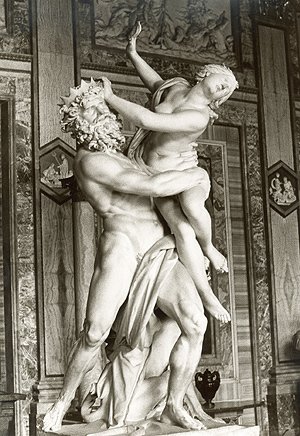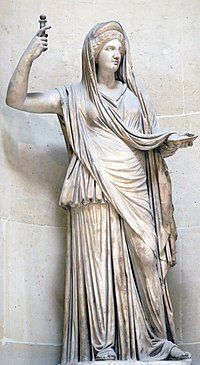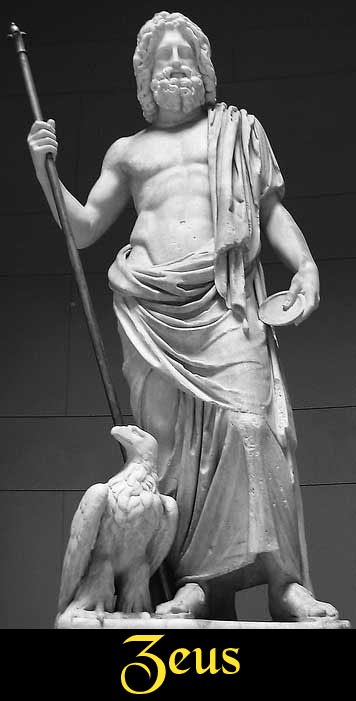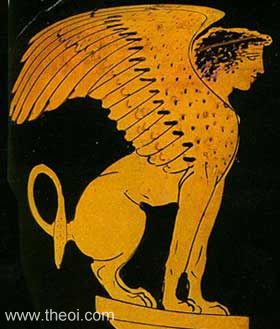Every once in a while, I get these weird fanatic obsessions about some book or movie or TV show, and it hijacks my daydreams for weeks at a time until it runs its course. It must have started when I discovered the movie The Nightmare Before Christmas a few days ago and I became an embarrassing fangirl (hey, don't judge), and now I have felt a weird pull towards Tim Burton movies and macabre topics in general this week. It's like a craving...an Edgar Allan Poe addiction...and a Hitchcock obsession... And then it hit me. It's divine inspiration, you silly!Hades, the God of the Dead, is obviously using his influence to point my thoughts towards the ghostly and the grim. He doesn't want to wait around for Halloween or something. He knows that he has my sympathy and respect, so he wants me to talk about him next.
So I shall.
Hades is the constantly misunderstood God of the Dead, who may have a ghostly realm and rather morbid interests, but is the farthest thing from evil. His parents are Rhea and Kronos, the titans, and he and his brothers, Zeus and Poseidon, are sort of a trio of power representing all aspects of the earth besides Gaia, the terrestrial earth itself: sea, sky, and underground.
Now, it often bothers me that his portrayal in popular culture is often skewed and prejudiced. Sometimes he is erroneously equated with the Devil, simply because his realm is underground, and his kingdom is misrepresented as Hell--but nothing could be more inaccurate. This was what vexed me the most about the Percy Jackson film adaptation--even more than the twelve-year-old protagonists suddenly becoming sixteen, or Grover's character randomly becoming a racial stereotype--Hades and his realm were both shown as evil and hellish, which it wasn't in the book. So everyone gets punished after they die, no matter what sort of life they led? Gosh. The Greek weren't that cynical!
True, he does punish evildoers, and they go to a place called the Fields of Punishment that is somewhat akin to the Christian concept of Hell. But he also rewards the just and the noble, and sends them to a blissful eternity in Elysium, the Greeks' Heaven. If a soul chooses to be reincarnated three times, and achieves Elysium all three times, then he or she is allowed an "all-access pass" to another, even more wonderful, part of Elysium: the Isles of the Blessed. Most people, however, are neither extremely good or extremely evil, and so their souls drift about in the nuetral Fields of Asphodel forever.
Does that sound Satanic or evil to you? All Hades does is make sure people get what they truly deserve--whatever that might be. He is devoted to justice--and that's more than I can say for Zeus or the other Olympians, who pursue fairly selfish interests and fail to see any kind of objective morality. Zeus is above his own rules. Poseidon's temper and emotions get in the way of his judgement. Aphrodite thinks that "love" can justify any wrong. And even the beloved Athena is more concerned about what is wise than what is right.
 I guess justice is never popular, and Hades can come across as merciless and even cruel, because he is so unrelenting. But he is not without the capacity for empathy, as shown in the story of Orpheus. Orpheus was a talented musician that completely adored his wife, Eurydice. They lived in matrimonial bliss for some time, but one day, she was bitten by a poisonous snake and died. Orpheus, nearly mad with grief, descended to the Underworld to bring Eurydice back, and charmed his way past the guards (Charon the ferryman, Cerberus the dog, etc) with his enchanting music on the lyre. Finally, he reached Hades' palace. Persephone was moved by his tale of devotion and grief, and persuaded her husband to give Orpheus an audience. Orpheus began to play for them, a song that was a wordless expression of the love he felt, and the pain at losing his beloved--and Hades, the calculating ruler of darkness, wept.
I guess justice is never popular, and Hades can come across as merciless and even cruel, because he is so unrelenting. But he is not without the capacity for empathy, as shown in the story of Orpheus. Orpheus was a talented musician that completely adored his wife, Eurydice. They lived in matrimonial bliss for some time, but one day, she was bitten by a poisonous snake and died. Orpheus, nearly mad with grief, descended to the Underworld to bring Eurydice back, and charmed his way past the guards (Charon the ferryman, Cerberus the dog, etc) with his enchanting music on the lyre. Finally, he reached Hades' palace. Persephone was moved by his tale of devotion and grief, and persuaded her husband to give Orpheus an audience. Orpheus began to play for them, a song that was a wordless expression of the love he felt, and the pain at losing his beloved--and Hades, the calculating ruler of darkness, wept. Hades decided to show Orpheus pity, and said he would relinquish Eurydice's soul--on one condition: Orpheus must make his way through the tunnel to the world above without looking back to be sure that Eurydice was following him. He would need to trust the Lord of the Dead. Orpheus agreed to the terms and began to trek through the tunnel--but he couldn't hear his wife's footsteps. He forced himself to keep moving. Finally, just as he was about to break out into the sunlight, he couldn't bear it any longer, and he looked back to see if she was there--and Eurydice was dragged back to the Underworld, lost to him forever because of his lack of faith.
[In case you didn't know this before, in Harry Potter and the Sorcerer's (or Philosopher's) Stone, the three-headed dog Fluffy is charmed to sleep with an enchanted harp, in order to slip past him to what he is guarding. Rowling knows her Greek mythology.]
When he received the Underworld as his domain after the Titan War, Hades was banished from the world above and the heavenly abode of the gods, Mount Olympus, except for one day out of the year: the Winter Solstice (just a few days before Christmas), the shortest day of the year which is almost in complete darkness.
Now, granted, I understand why the Olympians are not too crazy about having Hades at their family reunions. He is certainly a frightening being to behold, armed with the Helm of Darkness (a helmet that allows him to become invisible and to spread fear), with demons called the Furies as his minions and Cerberus, the vicious three-headed dog, as his pet. Hades always was the "different" one of the family, far more introverted and cold than his brothers. It's not that Hades doesn't feel emotions acutely, but he has far more control over his anger--instead of exploding, he lets it brew and fester into resentment for centuries. Ahem. A little passive-aggressive. But it's a refreshing change of pace from his melodramatic relatives.
Unlike his brothers, Hades is known only for his one romantic exploit, his beloved wife. I guess, because it is harder to move his heart, when he falls in love, he falls permanently. This situation just further shows that Hades is unchanging, resolute, unlike his brothers who are known for being ever-changing like the tides and the storms. Abducting the goddess of spring is the only selfish thing we ever really see Hades do, and, well, if you were that desperate and lonely, you might do something unwise too. I can understand, too, why he fell in love with her--though she has her mother's innocence and humility, she's also her father's daughter, and is therefore queenly and proud too. Hades probably had no trouble imagining her the Queen of the Underworld. And because Persephone was kept apart from the rest of the gods by her mother's sheltering, she could probably relate to his feeling of isolation.

Despite the shunning his relatives give him, Hades doesn't exist in a constant state of misery. He is extremely powerful, and has more autonomy than any of the gods--because he is so removed from Zeus' authority, he doesn't really have to answer to anybody. He owns all the riches under the earth. He has a magnificent palace in the Underworld, and an orchard that Persephone tends to in the winter. And I think it gives him personal satisfaction, knowing that he has integrity while his relatives have very little, although this probably also makes him bitter, witnessing their hypocrisy.
Besides the Helm of Darkness, Hades' symbols include the color black, shadows, skulls and spirits, and his dog, Cerberus.
The natural fear of Hades and what he stands has interesting psychological implications. Humans instinctively fear the dark, not because darkness is necessarily evil, but because it shrouds things from our vision--we fear what we don't know, and death is the very greatest chasm of the unknown. Just remember, there is nothing in the dark that wasn't there when the light was turned on. (That last bit is a little Twilight Zone quote for you.)
All in all, he might be intimidating and a bit unnerving, but Hades was literally given a bad lot in life when he and his brothers gambled for the domains of the world. It was his Fate to be an outcast.





